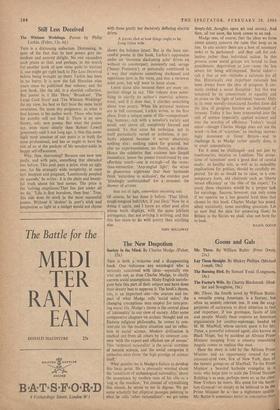Mickey Phillips's first novel (Meat) dealt with slaughterhouses. In his
second, Lay Them Straight, he has turned to funeral parlours, but not whole-heartedly enough—or was it that what seemed a clever idea failed to make a book? It wasn't that I disbelieved Mr. Phillips's de- tails about replacing blood with embalming fluid through the main artery under the armpit, or rubbing 'the unit' all over with skin cream to stop the growth of mould; but by comparison with his later inventions these things seemed ordinary, and in association with them they took on the flavour of lesser fantasies, The triumph of The Loved One was that it mixed horror with total conviction. As for Mr. Phillips's style, here is a typical paragraph:
Sir Arthur bent down to the wainscoting and tried to insert a two-pin plug into a three- pin socket. It would not go so he gave it a kick; there was a flash and the cord between the plug and the camera began to smoulder and spit molten rubber.
For those who enjoy this sort of thing, it is all a merry romp. I prefer satire to bear a more apt relation to the way-people—and electrical apparatus—actually behave.
Guarding the Limes •
Eastern Arabian Frontiers. By J. B. Kelly. (Faber, 42s.) The Middle East and the West. By Bernard Lewis. (Weidenfeld and Nicolson, 21s.)
ONE of the most important, although least written-about, aspects of the impact of Arab nationalism on Western interests in the Middle East has been the mounting pressure of Iraqi, Sa'udi and Yemeni claims to sovereignty over Kuwait, the Trucial Coast and Oman, and the Protectorates and Colony of Aden respectively. All these territories, consisting of small Sultan- ates and Shaikhdoms, were, and, to a diminish- ing extent, are under varying degrees of British protection and influence. More or less con- tinuous attempts have been made, over the last twenty years and more, by their independent and relatively powerful Arab neighbours, to erode and to destroy that British influence and pro- tection, and to absorb these Sultanates and Shaikhdoms into their own dominions.
The remaining British military presence in the Middle East has, however, been sufficient to ensure that this pressure has been applied by other than military means—by propaganda, by bribery, and by arguments and appeals based on history. The historical arguments brought for- ward on both sides have been complicated both by the lack of accurate maps more than about thirty years old, by the fluid nature of frontier lines in an area inhabited largely by nomads who cross and re-cross frontier lines in the course of their seasonal migrations, and by the almost equally fluid nature of the allegiance professed by these nomads.


































 Previous page
Previous page